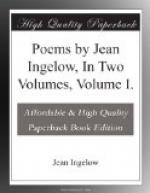“So, after gazing, homeward turn, and mount
To that long chamber in the roof; there
tell
Your heart the laid-up lore it holds to count
And prize and
ponder well.
“The lookings onward of the race before
It had a past to make it look behind;
Its reverent wonder, and its doubting sore,
Its adoration
blind.
“The thunder of its war-songs, and the glow
Of chants to freedom by the old world
sung;
The sweet love cadences that long ago
Dropped from the
old-world tongue.
“And then this new-world lore that takes account
Of tangled star-dust; maps the triple
whirl
Of blue and red and argent worlds that mount
And greet the
Irish Earl;
“Or float across the tube that Herschel
sways,
Like pale-rose chaplets, or like sapphire
mist;
Or hang or droop along the heavenly ways,
Like scarves of
amethyst.
“O strange it is and wide the new-world lore,
For next it treateth of our native dust!
Must dig out buried monsters, and explore
The green earth’s
fruitful crust;
“Must write the story of her seething youth—
How lizards paddled in her lukewarm seas;
Must show the cones she ripened, and forsooth
Count seasons
on her trees;
“Must know her weight, and pry into her age,
Count her old beach lines by their tidal
swell;
Her sunken mountains name, her craters gauge,
Her cold volcanoes
tell;
“And treat her as a ball, that one might pass
From this hand to the other—such
a ball
As he could measure with a blade of grass,
And say it was
but small!
“Honors! O friend, I pray you bear with
me:
The grass hath time to grow in meadow
lands,
And leisurely the opal murmuring sea
Breaks on her
yellow sands;
“And leisurely the ring-dove on her nest
Broods till her tender chick will peck
the shell
And leisurely down fall from ferny crest
The dew-drops
on the well;
“And leisurely your life and spirit grew,
With yet the time to grow and ripen free:
No judgment past withdraws that boon from you,
Nor granteth it
to me.
“Still must I plod, and still in cities moil;
From precious leisure, learned leisure
far,
Dull my best self with handling common soil;
Yet mine those
honors are.
“Mine they are called; they are a name which
means,
’This man had steady pulses, tranquil
nerves:
Here, as in other fields, the most he gleans
Who works and
never swerves.
“We measure not his mind; we cannot tell
What lieth under, over, or beside
The test we put him to; he doth excel,
We know, where he is tried;
“But, if he boast some farther excellence—
Mind to create as well as to attain;
To sway his peers by golden eloquence,
As wind doth shift a fane;




